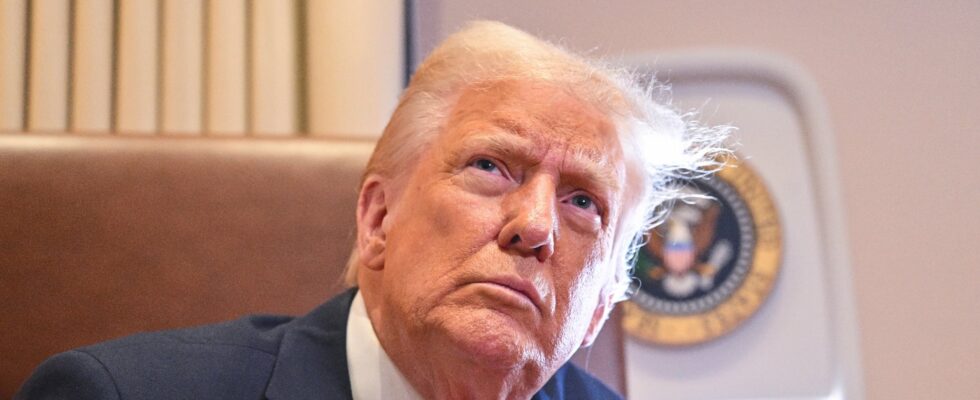Since the inauguration of Donald Trump, it has become a habit. Each new day of mandate, its shattering announcement. Each new day of mandate too, its commercial sanctions imposed. This Monday, February 10, it was the turn of steel and aluminum to be targeted by the American president. “Today I simplify our customs duties on steel and aluminum so that everyone understands what it means,” Donald Trump told the White House after having signed decrees imposing customs duties 25 % on these metals imported into the United States.
As of March 12, the date on which these customs duties will be effective, only Australia will be spared. “The American president accepted that an exemption be envisaged in the interest of our two countries,” Prime Minister Anthony Albanese told the press. After the entry into force of customs duties against China (already sanctioned by Beijing), this decision marks a new escalation of the commercial policy of Donald Trump.
Remove the deficit of the United States
Why are steel and aluminum in the sights of the American president? First of all because steel production in the United States is strongly politicized. Some policies argue that the country must be able to produce enough high quality steel to supply its army in the event of a national emergency, without having to rely on imports. Donald Trump perceives these customs duties as a way of reducing the trade deficit of the United States, of obtaining concessions from the countries referred to on issues such as immigration, or to protect jobs. “For me, customs duties are very pretty words. These are words that will make our country again rich again,” he said during the electoral campaign.
Among the countries affected by these customs rights are undoubtedly the main steel suppliers of the United States, namely Canada, Brazil, Mexico, and South Korea. If China is the largest producer and steel exporter in the world, it does not appear at the top of the Imports of the United States. Last year, Beijing sent nearly 500,000 tonnes of steel across the Atlantic, or less than 2 % of American steel imports.
In 2024, about a quarter of the whole of the steel used in the United States was imported. A proportion much lower than that of aluminum imports. Even last year, almost half of the entire aluminum used in the United States came from abroad. In the first place of the exporting countries across the Atlantic, is without the slightest competition, Canada. In 2024, almost 3.1 million tonnes of Canadian aluminum was imported into the United States. A number twice as high as the total exports of the following nine countries together.
Since January 20, Donald Trump’s offensive commercial policy has been shaking world currency markets and has raised fears of a new explosion in American inflation. For the moment, the consequences of this new announcement are less: the dollar increased by 0.1 % on Monday and aluminum, negotiated on the London metal stock exchange, dropped by 0.4 %.
Expected international sanctions
Donald Trump’s last announcement, however, did not fail to react. In France, for example, the Minister of Foreign Affairs, Jean-Noël Barrot, assured this Monday that the European Union “would reply” to new customs duties announced by Donald Trump. “There is no hesitation when it comes to defending our interests,” he said on TF1, adding that the European Commission had a mandate to act in this direction.
A declaration confirmed by the president of the institution, Ursula von der Leyen. “The unjustified customs duties imposed on the European Union will not remain unanswered: they will give rise to firm and proportionate countermeasures,” she said on Tuesday in a statement. The spokesperson for the Chinese Foreign Ministry, Guo Jiakun, was slightly more incisive by retorting “that there is no way out of protectionism and no winning in a trade war or customs “.
Between Donald Trump and customs duties on steel and aluminum, it’s a long -standing story. During his first term, in 2018, the American president had already taxed imports from Canada, Mexico and the European Union. Steel, up to 25 % and aluminum by 10 %. Its justification of the time: protecting the American industry, confronted according to him with unfair competition from Asian and European countries. Canada and Mexico had finally succeeded, a year later, to conclude an agreement with the principal. The European Union import taxes, they remained unchanged until 2021.
The list of commercial sanctions is expected to lie in the coming days. Donald Trump said on Sunday that he would announce “Tuesday or Wednesday” of “reciprocal customs rights” in order to align the taxation of incoming products in the United States with that of American export products “s abroad.” S ‘ They tax us 130 % and that we do not tax them, it will not remain like that, “he said. So there will not be to wait a long time before knowing the names of his next targets.
